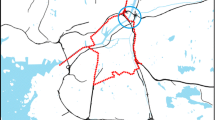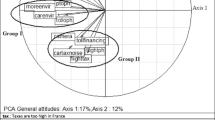Abstract
This paper examines acceptance of different ways to fund transport infrastructure. Our methodological approach, stemming from social psychology (attitudes), is based on latent variables. We differentiate between three types of explanatory variables: socioeconomic, (material) self-interest, and personal values. This approach has previously been used to study acceptance of congestion charges, but not (to our knowledge) acceptance of funding alternatives. We conclude that the funding alternatives that are less economically efficient (more deadweight loss per revenue) are unfortunately often the most attractive according to the public. User charges on new infrastructure are popular but might lead to sub-optimal use (since it leads to under usage of the new infrastructure). If charges are also applied to parallel infrastructure, the problem with suppressed demand is reduced, but so is acceptance. VAT (low deadweight loss) is unpopular, whereas income tax (higher deadweight loss) is more accepted. Therefore, politicians will need to handle tradeoffs between acceptance and efficiency. Possible solutions might be found in acceptance theory or by bundling measures. We also find that both context-specific self-interest and broader personal values explain individuals’ preferences towards different funding forms. In many cases the two types of independent variables are highly correlated since variables indicating self-interest against a specific funding form contribute to the formation of general personal values, too. Our results seem to indicate, however, that the explanatory power of more general personal values is larger than that of context-specific self-interest.

Similar content being viewed by others
Notes
CINT is one of the world’s leading marketplaces for reaching insights into consumer preferences. The CINT panels follow the ESOMAR rules for panel management. The CINT panels have half a million registered participants all over Sweden.
References
Agrawal, A.N.: Would Americans pay more in taxes for better transportation? Answers from 7 years of national survey data. Transportation 46, 819–840 (2019)
Agrawal, A.W., Nixon, H., Murphy, V.: What Do Americans Think About Federal Tax Options to Support Public Transit, Highways, and Local Streets and Roads? Results from Year 3 of a National Survey. Paper presented at the 92nd Annual Meeting of the Transportation Research Board, Washington, D.C (2013)
Anesi, V.: Earmarked taxation and political competition. J. Public Econ. 90(4–5), 679–701 (2006)
Banister, D.: Critical pragmatism and congestion charging in London. Int. Soc. Sci. J. 55(176), 249–264 (2003)
Bartley, B.: Mobility impacts, reactions and opinions—traffic demand management options in Europe, The MIRO Project. Traffic Eng. Control 36(11), 596–603 (1995)
Baumol, W.J., Oates, W.E.: The Theory of Environmental Policy, 2nd edn. Cambridge University Press, Cambridge (1988)
Börjesson, M., Hamilton, C.J., Näsman, P., Papaix, C.: Factors driving public support for road congestion reduction policies—Congestion charging, free public transport and more roads in Stockholm, Helsinki and Lyon. Transp. Res. Part A 78, 452–462 (2015)
Börjesson, M., Eliasson, J., Hamilton, C.: Why experience changes attitudes to congestion pricing—The case of Gothenburg. Transp. Res. Part A 85, 1–16 (2016)
Congleton, R.D.: Political institutions and pollution control. Rev. Econ. Stat. 74(3), 412–421 (1992)
Deroubaix, J.-F., Lévèque, F.: The rise and fall of French Ecological Tax Reform—Social acceptability versus political feasibility in the energy tax implementation process. Energy Policy 34(8), 940–949 (2006)
Eagly, A.H., Chaiken, S.: The Psychology of Attitudes. Harcourt Brace Jovanovich Collage, Orlando (1993)
Eliasson, J.: Is congestion pricing fair? Consumer and citizen perspectives on equity effects. Transp. Policy 52, 1–15 (2016)
Eliasson, J., Jonsson, L.: The unexpected “yes”—Explanatory factors behind the positive attitudes to congestion charges in Stockholm. Transp. Policy 18(4), 636–647 (2011)
Fishbein, M., Ajzen, I.: Attitudes and opinions. Annu. Rev. Psychol. 23(1), 487–544 (1972)
Gaunt, M., Rye, T., Allen, S.: Public acceptability of road user charging: The case of Edinburgh and the 2005 referendum. Transp. Rev. 27(1), 85–102 (2007)
George, H.: Progress and Poverty. Robert Schalkenbach Foundation, New York (1955)
Giuliano, G.: An assessment of the political acceptability of congestion pricing. Transportation 19, 335–358 (1992)
Haidt, J., Graham, J., Joseph, C.: Above and below left-right—Ideological narratives and moral foundations. Psychol. Inq. 20, 110–119 (2009)
Hamilton, C.J., Eliasson, J., Brundell-Freij, K., Raux, C., Souche, C., Kiiskilää, K., Tervonen, J.: Determinants of congestion pricing acceptability (Working papers in Transport Economics 2014:11). KTH (2014)
Hammar, H., Jagers, C.S.: Can trust in politicians explain individuals’ support for climate policy? The case of CO2-tax. Clim. Policy 5(6), 613–625 (2006)
Hammar, H., Jagers S.C., Nordblom, K.: Skatter och Skattefusk. In: Holmberg, S., Weibull, L. (eds.) Lyckan kommer, lyckan går (SOM-rapport nr 36, pp. 99–114). Kungälv, Grafikerna Livérna (2005)
Hammarle, M., Best, R., Crosby, P.: Public acceptance of carbon taxes in Australia. Energy Economics, September 2021.
Hess, S., Börjesson, M.: Understanding attitudes towards congestion pricing—A latent variable investigation with data from four cities. Transp. Lett. 11, 1–15 (2017)
Inglehart, R.: Human beliefs and values—A cross-cultural sourcebook based on the 1999—2002 values surveys. http://www.worldcat.org/title/human-beliefs-and-values-a-cross-cultural-sourcebook-based-on-the-1999-2002-values-surveys/oclc/857139336?referer=br&ht=edition (2004) Accessed February 21st 2017
Kallbekken, S., Aasen, M.: The demand for earmarking—Results from a focus group study. Ecol. Econ. 69(11), 2183–2190 (2010)
Kallbekken, S., Sælen, H.: Public acceptance for environmental taxes—Self-interest, environmental and distributional concerns. Energy Policy 39(5), 2966–2973 (2011)
Katz, E., Lazarsfiled, P.F.: Between media and mass/the part played by people/the two step flow of communication. In: Boyd-Barrett, O., Newbold, C. (eds.) Approaches to Media—A Reader. Arnold, London (1995)
Lerner, M.: The Belief in a Just World: A Fundamental Delusion. Plenum, New York (1980)
McAusland, C.: Voting for pollution policy—The importance of income inequality and trade openness. J. Int. Econ. 61(2), 425–451 (2003)
McLeod, D.M., Kosicki, G.M., McLeod, J.M.: Resurveying the boundaries of political communication effects. In: Briant, J., Zillmann, D. (eds.) Media Effects. Advances in Theory and Research. Lawrence Erlbaum Associates, Mahwah (2002)
National Academy of Public Administration.: Financing Transportation in the 21st Century—An Intergovernmental Perspective. https://www.napawash.org/uploads/Academy_Studies/08-16.pdf (2008) Accessed February 22 2017
Newbold, C.: The media effects tradition. In: Boyd-Barrett, O., Newbold, C. (eds.) Approaches to Media—A Reader. Arnold, London (1995)
Nozick, R.: Anarchy, State, and Utopia. Basic Books, New York (1974)
Nyborg, K.: Homo Economicus and Homo Politicus—Interpretation and aggregation of environmental values. J. Econ. Behav. Organ. 42(3), 305–322 (2000)
Oates, W.: Fiscal Federalism. Harcourt Brace, New York (1972)
Odeck, J., Bråthen, S.: On public attitudes toward implementation of toll roads—The case of Oslo Toll Ring. Transp. Policy 4(2), 73–83 (1997)
Olson, M.: The Logic of Collective Action. Harvard University Press, Massachusetts (1965)
Rawls, J.: A Theory of Justice. Harvard University Press, Cambridge (1971)
Rienstraa, S.A., Rietvield, P., Verhoef, E.T.: The social support for policy measures in passenger transport—A statistical analysis for the Netherlands. Transp. Res. Part D 4(3), 181–200 (1999)
Rothstein, B., Stolle, D.: Impartiality and the welfare state: an institutional approach. In: Hooghe, M., Stolle, D. (eds.) Generating Social Capital: Civil Society and Institutions in Comparative Perspective. Palgrave Macmillan, New York (2003)
Sælen, H., Kallbekken, S.: A choice experiment on fuel taxation and earmarking in Norway. Ecol. Econ. 70(11), 2181–2190 (2011)
Schade, J.: European research results on transport pricing acceptability. In: Schade, J., Schlag, B. (eds.) Acceptability of Transport Pricing Strategies, pp. 109–123. Elsevier Science, Oxford (2003)
Schade, J.: Akzeptanz von Straßenbenutzungsgebühren—Entwicklung und Überprüfung eines Modells (Doctoral Thesis, Technischen Universität Dresden, Dresden) https://d-nb.info/97769884X/34 (2005) Accessed August 23rd 2017
Schade, J., Schlag, B.: Acceptability of urban transport pricing. (VATT Research Report 72, Helsinki). Helsingfors, Government Institute for Economic Research (2000)
Schade, J., Schlag, B.: Acceptability of urban transport pricing strategies. Transp. Res. Part F 6(1), 45–61 (2003)
Schlag, B., Schade, J.: Public acceptability of traffic demand management in Europe. Traffic Eng. Control 41(8), 314–318 (2000)
Schlag, B., Teubel, U.: Public acceptability of transport pricing. IATSS Res. 21, 134–142 (1997)
Schuitema, G., Steg, L., Rothengatter, J.A.: The acceptability, personal outcome expectations, and expected effects of transport pricing policies. J. Environ. Psychol. 30(4), 587–593 (2010)
Stern, P.C., Dietz, T., Kalof, L.: Value orientations, gender, and environmental concern. Environ. Behav. 25, 322–348 (1993)
Torgler, B.: Tax morale, rule governed behaviour and trust. Const. Polit. Econ. 14(2), 119–140 (2003)
Trafikverket.: Analysmetod och samhällsekonomiska kalkylvärden för transportsektorn—ASEK 6.0. Trafikverket (2016)
Uslaner, E.M.: The Moral Foundations of Trust. Cambridge University Press, Cambridge (2002)
Wallman Lundåsen, S., Wollebæk, D.: Diversity and Community Trust in Swedish Local Communities. Institut for samfunnsforskning, Oslo, Norway Journal of Elections, Public Opinion and Parties 23(3): Assessing the Effects of Immigration and Diversity in Europe, pp. 299–321 (2013)
Yusuf, J.-E., O’Connell, L., Anuar, K.A., Mahar, K.: Paying for infrastructure in an urban environment—Roles of ideological beliefs and self-interest in support of two funding mechanisms. Transp. Res. Record 2530, 1–8 (2015)
Acknowledgements
This research was funded by the Swedish Transport Administration. Submitting a paper on this subject was a pledge made in our research application. Björn Hasselgren from the Swedish Transport Administration has given valued feedback during our work. However, we (the authors) are solely responsible for the content in this paper.
Funding
Funding was provided by Trafikverket (Grant No. 2015/36884).
Author information
Authors and Affiliations
Contributions
MA has led the project. LJ has done most of the econometrics. KB-F has been responsible for the method. KB has been responsible for data collection. All authors have, to different extent, contributed to the writing of first manuscript as well as later revisions.
Corresponding author
Ethics declarations
Conflict of interest
On behalf of all authors, the corresponding author states that there is no conflict of interest.
Additional information
Publisher's Note
Springer Nature remains neutral with regard to jurisdictional claims in published maps and institutional affiliations.
Supplementary Information
Below is the link to the electronic supplementary material.
Rights and permissions
About this article
Cite this article
Andersson, M., Jonsson, L., Brundell-Freij, K. et al. Who should pay? Public acceptance of different means for funding transport infrastructure. Transportation 50, 1425–1448 (2023). https://doi.org/10.1007/s11116-022-10282-z
Accepted:
Published:
Issue Date:
DOI: https://doi.org/10.1007/s11116-022-10282-z




